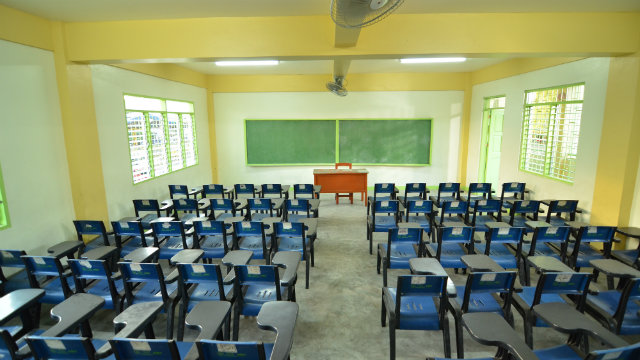SUMMARY
This is AI generated summarization, which may have errors. For context, always refer to the full article.

MANILA, Philippines – Some sectors have expressed concern that the K to 12 program would further worsen the deteriorating performance of the public high school students in National Achievement Test (NAT).
In a session on the performance of the Department of Education (DepEd) at a forum on Tuesday, March 19, One Small Step Forward Foundation Inc. President Jaime del Rosario noted two trends: the lower NAT scores of high school students compared to elementary students, and the sentiments of teachers about their lack of skills to handle the subjects required in the additional two years of schooling.
“K to 12 is going to add two more years to high school and that’s the system that scores lower so I’m concluding…that we have teachers who can teach on basic teaching skills and teach the basic subjects as well…Come high school, when it comes to Trigonometry, Algebra, and pre-Calculus, they have a difficult time,” One Small Step Forward Foundation Inc. President Jaime del Rosario said in the panel.
“We’re going to stretch high school to 6 years so we might have a bigger issue, won’t we?” Del Rosario stressed.
“And I hear high school principals and high school master teachers on TV being interviewed saying ‘We’re not prepared, we don’t know what to do, what to teach.’ So all of these tell me you might even have a bigger problem,” Del Rosario added.
The NAT is an annual examination given to both Grade 6 and 4th Year students to measure the knowledge and mastery over the subjects like Mathematics, Science, Filipino, and Araling Panlipunan.
Declining performance
The performance of the country’s public high school students in the NAT has been on the decline and are significantly lower than the scores of public elementary students.
DepEd data showed that the average NAT score of public high school students for School Year 2011 to 2012 was significantly lower at 48.9% compared to the elementary students’ 66.79%.
This trend has been apparent for the past 5 years.
Deped data showed that public high school students posted an average score of:
- 48.9% – SY 2011 to 2012
- 47.92% – SY 2010 to 2011
- 45.56% – SY 2009 to 2010
- 46.71% – SY 2008 to 2009
- 49.26% – SY 2007 to 2008
The average NAT scores of public elementary students were:
- 66.79% – SY 2011 to 2012
- 68.15% – SY 2010 to 2011
- 68.01% – SY 2009 to 2010
- 65.55% – SY 2008 to 2009
- 64.81% – SY 2007 to 2008
2012 achievements
DepEd Undersecretary Mario Deriquito, who was at the forum, replied that the department has been dealing with infrastructure, classroom, and other gaps needed to prepare the educational system under a K to 12 scheme.
He cited the target of closing the classroom gap of more than 60,000 by 2016 and how Public Private Partnership (PPP) scheme has been tapped in building around 20,000 classrooms in 2012 alone.
The PPP School Infrastructure Project was able to create more than 9,000 classrooms in various locations in Luzon in its first phase and more than 10,000 classrooms in Visayas and Mindanao in the second phase, Deriquito reported.
Apart from classrooms, he added that the DepEd also created 61,510 new teacher items and hired 3,500 additional bookkeeper and accounting staff for various public schools nationwide.
Dequito also said the department also helped advance the following key reform agenda:
- Enactment of the Kindergarten Education Act
- K to 12 Bill ratified in both Houses of Congress
- Approval of Philippine Qualifications Framework
- Rationalization Plan of the department finalised and submitted for approval
Add a comment
How does this make you feel?
There are no comments yet. Add your comment to start the conversation.